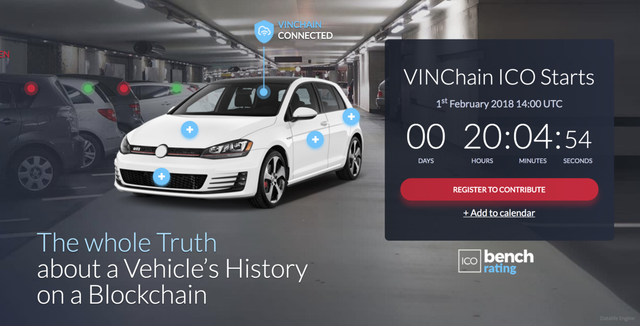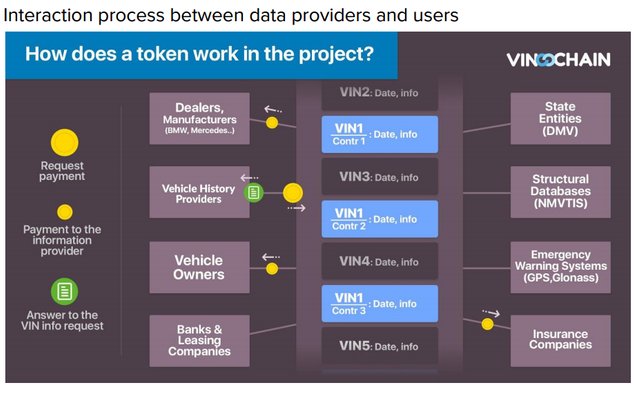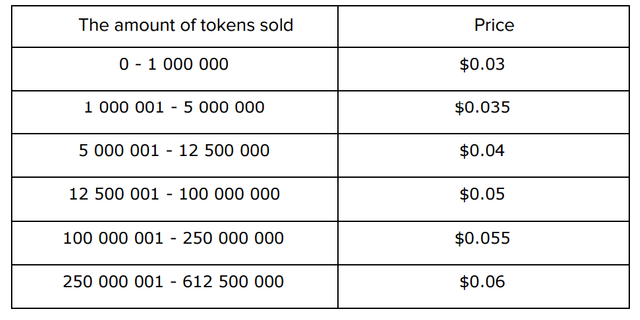ICO VinChain — history of decentralized vehicles

ICO VinChain — https://vinchain.io/en — history of decentralized vehicles

The problem was caught and explained by the economist of the Nobel Prize George Akerlof in his scientific article “The market for” Lemon “: uncertainty about quality and the mechanism of the market” in 1970. He described a market mechanism in which one side (the seller) knew much more about the product than the other party (the buyer). This is also known as the “market with asymmetric information”. An example is the used car market. When selling a car, the seller usually knows more about the car than about the buyer. This is a problem for the buyer, because he discovers it for possible fraud. To hedge the risk of buying “bad” car buyers, they reduce the price they are willing to pay for the car. This can lead to the disappearance of the entire used car market.
Here’s how:
● Buyers can not distinguish good cars from bad cars, so they are willing to pay less for their vehicles. This reduces the average price of a car.
● Due to lower average prices, most cars sold are of poor quality, so those who sell good cars are leaving the market.
● As a result, the average quality of goods on the market deteriorates, and as a result, buyers are willing to pay less than before. Because of this, the average price of a car decreases. 2
● Now average sellers of cars are forced to leave the market.
● The quality of the car will deteriorate again, and the average number of buyers wishing to pay will decrease proportionally. This cycle will continue until the buyer stops buying a car, because he will assume that the quality is bad.
● As a result, this will lead to the loss of the market as a whole. This is the nature of the market with asymmetric information. This cycle can be stopped by eliminating the information asymmetry. Solution: The VinChain VinChain project solves the problem of asymmetric information in the used car market, creating a decentralized, unchanged, transparent, safe and reliable repository of the vehicle’s life cycle.
This cycle can be stopped by eliminating the information asymmetry.
Solution: VinChain
The VinChain project solves the problem of asymmetric information in the used car market, creating a decentralized, unchanged, transparent, safe and reliable repository of the vehicle’s life cycle.
VinChain is a block database that records all the information related to the vehicle. For each vehicle, information is accumulated during the entire period of use. This story is transparent and easily accessible to all.
To protect the accuracy of information, distributed storage technology is used. It provides absolute reliability and data security. Every day hundreds of thousands of used cars are sold in the world, and every buyer wants to receive reliable information about the technical condition of the car. This is an important issue of security, finance and security.
Unfortunately, there is no single database of cars. There is a commercial base, but it does not solve this problem. Their information is stored centrally, and there is an incorrect risk. The commercial base is closed and does not exchange information among themselves. As a result, car buyers are at risk of resigning and losing money.
VinChain solves this problem with blockchain technology.
For each car, we issue a passport of the blocks, which will be stored in a distributed basket. The VinChain project will unite all data providers and create a continuous history of the car, without the absence of a centralized database. Market participants, such as car manufacturers, auto dealers, insurance companies, banks and leasing companies, need a history of operation, and they must be transparent, accessible, reliable and authentic. Also, buyers who choose a car can immediately order our report.
How it works
If desired, the information corresponding to the requested VIN number will be searched and selected on the block. Each record will contain information about the data provider, date, VIN and use of the car.
Basic and economic use of Vinchain customers intends to implement a marker to facilitate the processing of automobile information requests in the VinChain system. End users will pay VinCoin in exchange for all information relating to the number of wines that are currently stored on the network. The information request is designed to rely on a very simple economic token for customers facing aspects of the payment system. To have a successful system of tokens today, you need to take advantage of a simple economy. A wide spread of systems is increasingly occurring when end users can understand the process enough to believe it. For users who want to receive information from the VinChain system, transaction costs will always be VinCoin.
Market volatility should be associated with fluctuations in automotive history data, and not with assumptions. VinChain Tokens will primarily be used or used by utilities that can be used to create stable transaction levels and ensure payment of cash payments and distribution of profits for all information providers. The initial price for the preliminary token will be 0.03 USD, the token price ico will be 0.05 USD, and the expected long-term transaction will be at least USD 3 per transaction. Compared to the current competitor’s level of $ 3, it can be easily seen, as 98% savings on demand for a similar history of brand cars.
Using solutions with a low coefficient of friction, we can offer competitors comparable products for a small fraction of the cost. Unlike traditional versions of the history of cars, a long-term launch will allow certified mechanics and other offenders in the control chain to provide information about a machine that would previously have been ignored because of the lack of insurance reporting.
Over time, as more and more information providers are verified, VinChain will provide more information about the history of the car.
Business model

The evaluation of supplier data is based on a ranking scale.
Each lock request is a paid token.
Each report contains data about cars from several suppliers.
Each vendor whose data used in the report receives a payment token.
VinChain receives a commission from each request.
The mechanism of the VinChain system is as follows:
When we receive a request for a lock, we search for data throughout the chain, and we create and provide information in a structured form. Charges for such information are accepted by the members of the registry, whose information is used. Both the seller and second-hand buyers will benefit from the removal of asymmetric information from the used car market.
When the buyer learns all the information available on a particular vehicle, it will create confidence in the process and will be willing to pay more. For sellers, the disclosure of the history of complete cars actually increases the cost of the car at the time of sale. If the buyer fully knows the operational history of the vehicle, it ensures that the car retains a certain level of value. The same can not be said for vehicles without messages.
This can be explained by the following example:
If the buyer must choose between two exactly the same vehicles, but one has a full report of the work, and the other does not; buyers will choose a car with full operational reports — although the report indicates that the car was damaged in the past and was repaired. That is, since the report guarantees the history of the car. The VinChain project will tell the truth. Every market participant has the right to know.
In the future, technologies can be adapted to related segments of the market: yachts, construction equipment, real estate.
Project Goals Change the global market for used cars, making them honest, transparent, reliable and with equal access to information for each participant.
Objective of the project
Create blocks with different levels of access and information protection. The level of data security should be consistent with the needs of government agencies.
Combine participants in the automotive industry, such as manufacturers, insurance companies, dealers, seminars, developers of the navigation system, into a single ecosystem for data exchange.
Create an infrastructure and provide direct access to the database for each market participant.
Description of ICO
Why Blockchain?
Advantages of using blockchain technology for VinChain:
Blockchain can store information about car maintenance.
Ability to configure access levels for different users.
Absolute reliability.
Transparent system of compensation of data providers.
Opportunity to work directly with each player on the market
Resistance to network attacks
Pre-sale tokens for early investors
Pre-sale: December 1–2, 12,000,000 tokens will be available for placement with a 3-month ban on sale after the expiration of the ICO.
Emissions and sales tokens in the ICO
ICO will be held from 22 to 15 April 2017. There are payment methods available for VinChain tokens:
Bitcoin (BTK)
Ethics (ETH)
Riple (XRP)
Litecoin (LTC)
Wave (WAVE)
USD, EUR, GBP
Available for placement: current 600.000.000.
The Token will be distributed to customers within 72 hours of the completion of the ICO.
Capsule The
maximum amount of investments: 34 500 000 US dollars.

Token distribution schemes:
The Genesis distribution scheme in the VinChain network will include a utility token of 1.000.000.000.
600.000.000 => is distributed among ICO members;
250 000 000 => is reserved among founders, consultants and other team members with a 2-year sales limit;
137.500.000 => with a 2-year sales restriction;
12 500 000 => reserved for initial investor with sales restriction 3 months after the end of ICO
VinChain team
Everyone in our team is an expert and has experience in the automotive industry. Each of us knows how to achieve the goal.
Alex Miles is the project manager. The founder of LLC “Texas”. Elena Krasenkova, head of sales at Auctions AAA Better Offer, increased monthly sales by 150%.
Alexey Listopad — Director of Marketing. 9 projects have been purchased, including the Auction with the best rate on the US market.
Andrey Krajnik is the founder of Easyexport.us, one of the top ten companies in the company. 500 with an annual turnover of more than 45 million US dollars
Jurgis Pleikitis — CEO and founder. Automated experts of online auctions. Serial entrepreneur. The total turnover of circulating companies in the amount of 500 million US dollars.

For more information:
WEB SITE: https://vinchain.io/en
WHITEPAPER: https://vinchain.io/files/white_paper.pdf
ANN THREAD: https://bitcointalk.org/index.php?topic=2349186.0.all
cryptobits3
https://bitcointalk.org/index.php?action=profile;u=1043526
0xb101dC14C6012D4faC2025a8f1Cdd4Daf1D9F154
Great idea, there are so many cars out there with unknown service histories because of antique era logbooks.
Downvoting a post can decrease pending rewards and make it less visible. Common reasons:
Submit
Hi cryptobits3, please email me at [email protected]
Thank you!
Downvoting a post can decrease pending rewards and make it less visible. Common reasons:
Submit